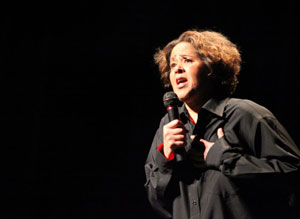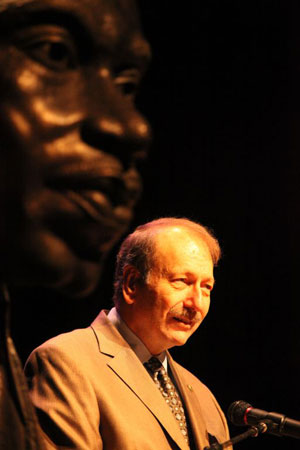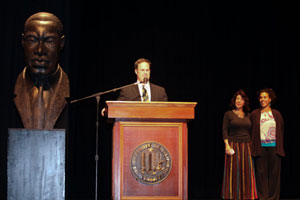To address the problems that arise over ongoing racial divides--gang violence, poverty, inequality--we need to look back to the lessons of Martin Luther King Jr. and reignite our collective imagination about what it's like to be the "other person."
That was the message delivered by actress, playwright, and professor Anna Deavere Smith at UC Santa Cruz's 26th annual Martin Luther King Jr. Memorial Convocation Thursday night at the Civic Auditorium.
Approximately 1,100 people, including UCSC students, regional high school students, community members, and campus staff and faculty came to see Smith give her keynote, titled "Race in America: Crossroads of Ambiguity." The presentation blended a lecture with dramatic performances using transcripts of interviews Smith has done over the span of her acting career.
"My project for my adult life has been to go around America with a tape recorder and interview people and then see what would happen if I walked in their words the way you think about walking in someone else's shoes," Smith said.
Smith is best known for her documentary style in plays such as Fires in the Mirror and Twilight: Los Angeles, 1992, both of which featured her as the sole performer of multiple and diverse characters.
She said she looks to King for a sense of inspiration and also a sense of history.
"What I think about when I think about disarray in our society around differences is that we lack the imagination to create an America where everybody gets a great education, where everbody gets great health care, because we can't imagine that our country can't be great unless everyone is great," Smith said.
Gesturing to the bust of Martin Luther King Jr. onstage, she said, "As I stand in the shadow of this great human being, this great ancestor, what I want to pull from that ancestry tonight is a reignited imagination about the other person."
Her dramatic monologues illustrating "the other" came from interviews with people including Charlayne Hunter-Gault, who made civil rights history as the first African American woman to graduate from the University of Georgia in 1962, and who went on to establish herself as one of television's premier journalists; with Mrs. Young-Soon Han, a Korean-American whose liquor store was destroyed during the Los Angeles race riots of 1992; and with Twilight Bey, a young African American male and an organizer of a gang truce between the Cripps and the Bloods.
In one of the monologues, Dr. Kiersta Kurtz-Burke, a physician at the public Charity Hospital in New Orleans, comes to some painful realizations during the Hurricane Katrina disaster. Patients at private hospitals had long been evacuated, while Charity Hospital patients and nurses went through six days without electricity, food, or water. In talking with her patients, who were mostly African American and poor, she found they had assumed they would not be helped by the government.
"They knew we were going to be the last ones out, they knew that the people in the private hospitals had private helicopters, it wasn't a shock to anybody," said Smith as Kurtz-Burke.
"The fact that it wasn't a shock to people was so shocking to me, and you just see the desperation of being poor in this country, and in some ways the distrust, I mean the deep down--that this is not the first time this has happened to people," she continued, in character. "I'm privileged, this is the first time that I have ever been totally abandoned by my government, but it's not the first time for the patients or the nurses or the other people who work at Charity Hospital."
Smith wrapped up her presentation with a vignette featuring Trudy Howell, director of Chance Orphanage in Johannesburg, South Africa, which houses orphans who are dying of AIDS whose parents died of AIDS.
"Here at UC Santa Cruz, you are training leaders," concluded Smith. "Are they going to do well, or are they going to do good in this particular moment? And how do we turn their imagination onto the possibility of doing both?"
The convocation included the presentation of the 2nd annual Tony Hill Memorial Award, honoring a person who has demonstrated the hallmarks of Hill's life: mentor, inspirational leader, gifted mediator, and bridge-builder in the community.
UCSC Chancellor George Blumenthal helped present the award to Santa Cruz City Councilman Ryan Coonerty; also on hand to honor Coonerty were Hill's wife, Melanie Stern-Hill, and daughter, Tara Hill Kemp.
Coonerty received a $500 cash contribution from UC Santa Cruz to be donated to the nonprofit of his choice; he selected the Santa Cruz Teen Center and Healthy Kids of Santa Cruz County.





